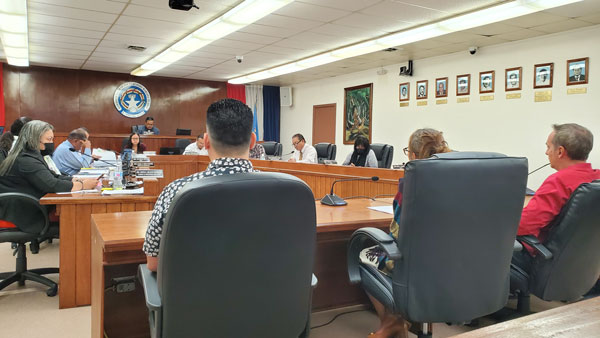‘CNMI needs more CW-1 workers due to increased level of constructions’

Pacific Rim president Keith J. Stewart, extreme right, answers questions during a Senate confirmation hearing Thursday. Stewart, Zenn Joseph Q. Tomokane, and Irene N. Holl were confirmed by the Senate as members of the Northern Marianas Technical Institute board of trustees. (FERDIE DE LA TORRE)
Pacific Rim president Keith J. Stewart said Thursday that the CNMI definitely needs additional personnel—both CNMI-Only Transitional Workers (CW-1) as well as the federal H-1B—to work on an anticipated increase in the level of construction work projects in the CNMI.
In response to a question by Sen. Edith E. DeLeon Guerrero (D-Saipan) during a Senate confirmation hearing, Stewart said he believes many government projects are in the works with their designs, so he does not have a good grasp on exactly when the manpower is going to be needed. It seems, though, that a lot of workers will be coming to the CNMI for these many projects, said Stewart, who received a “yes” vote from all nine senators for his appointment to serve as a member of the Northern Marianas Technical Institute board of trustees representing Saipan.
He noted that when Pacific Rim came to work on the Imperial Pacific International (CNMI) LLC casino/resort project in Garapan, they brought in over 300 workers from Guam to help with that project.
Stewart said that workforce coming from Guam is not available any longer.
“So any of the projects that will happen here in the CNMI are really going to need to be handled by the CNMI, either through local workforce or in my opinion, bringing in CW workers,” he said.
Citing a shortage in manpower to perform large-scale projects, among other things, Gov. Ralph DLG. Torres told the Biden administration last February about the CNMI’s need to have a permanent allotment of 3,000 CW-1 permits to support construction activities in the CNMI.
At the same meeting, Delegate Gregorio Kilili C. Sablan (Ind-MP) echoed Torres position that the CNMI needs enough skilled labor or CW-1 workers to build many federally funded infrastructure projects in the CNMI.























